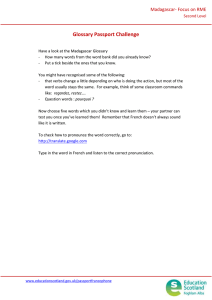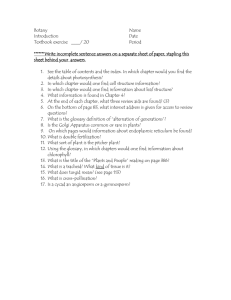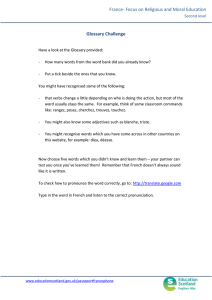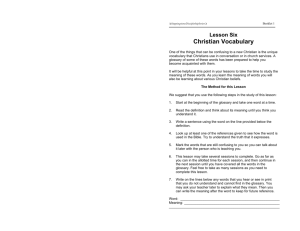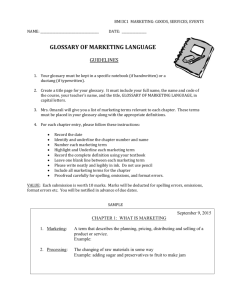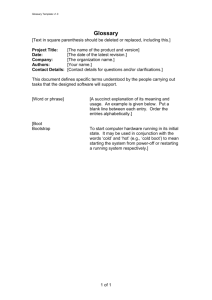A Glossary of Risk Management Terminology for Use in a
advertisement
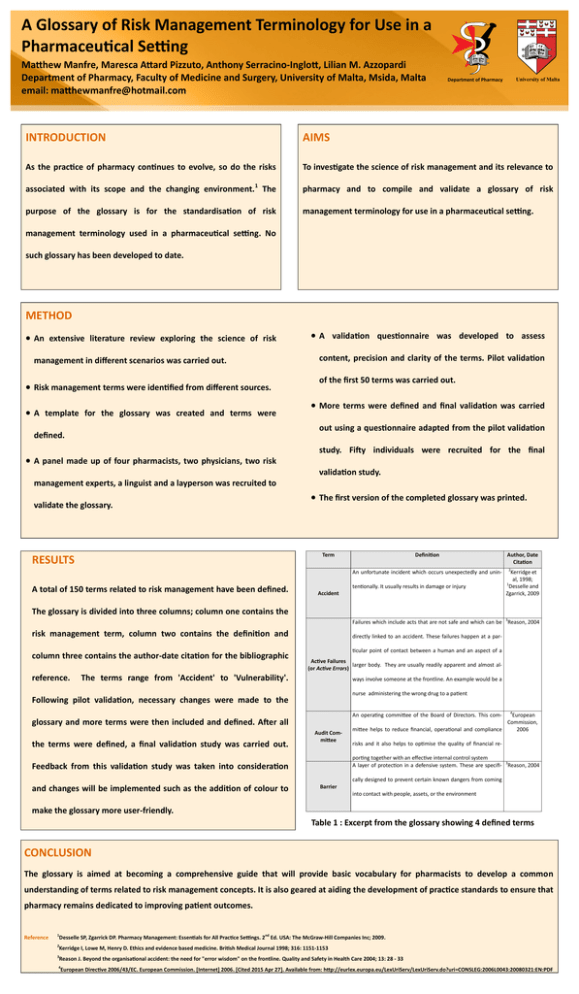
A Glossary of Risk Management Terminology for Use in a Pharmaceutical Setting Matthew Manfre, Maresca Attard Pizzuto, Anthony Serracino-Inglott, Lilian M. Azzopardi Department of Pharmacy, Faculty of Medicine and Surgery, University of Malta, Msida, Malta email: matthewmanfre@hotmail.com DEPARTMENT OF PHARM ACY UNIVERSI TY OF MA LTA University of Malta Department of Pharmacy INTRODUCTION AIMS As the practice of pharmacy continues to evolve, so do the risks To investigate the science of risk management and its relevance to 1 associated with its scope and the changing environment. The pharmacy and to compile and validate a glossary of risk purpose of the glossary is for the standardisation of risk management terminology for use in a pharmaceutical setting. management terminology used in a pharmaceutical setting. No such glossary has been developed to date. METHOD An extensive literature review exploring the science of risk management in different scenarios was carried out. Risk management terms were identified from different sources. A template for the glossary was created and terms were A validation questionnaire was developed to assess content, precision and clarity of the terms. Pilot validation of the first 50 terms was carried out. More terms were defined and final validation was carried out using a questionnaire adapted from the pilot validation defined. A panel made up of four pharmacists, two physicians, two risk study. Fifty individuals were recruited for the final validation study. management experts, a linguist and a layperson was recruited to validate the glossary. The first version of the completed glossary was printed. Term RESULTS Definition An unfortunate incident which occurs unexpectedly and unin- A total of 150 terms related to risk management have been defined. tentionally. It usually results in damage or injury Accident Author, Date Citation 2 Kerridge et al, 1998; 1 Desselle and Zgarrick, 2009 The glossary is divided into three columns; column one contains the Failures which include acts that are not safe and which can be 3Reason, 2004 risk management term, column two contains the definition and column three contains the author-date citation for the bibliographic reference. directly linked to an accident. These failures happen at a particular point of contact between a human and an aspect of a Active Failures larger body. They are usually readily apparent and almost al(or Active Errors) The terms range from 'Accident' to 'Vulnerability'. ways involve someone at the frontline. An example would be a nurse administering the wrong drug to a patient Following pilot validation, necessary changes were made to the glossary and more terms were then included and defined. After all the terms were defined, a final validation study was carried out. Audit Committee 4 European Commission, 2006 mittee helps to reduce financial, operational and compliance An operating committee of the Board of Directors. This com- risks and it also helps to optimise the quality of financial reporting together with an effective internal control system A layer of protection in a defensive system. These are specifi- 3Reason, 2004 Feedback from this validation study was taken into consideration cally designed to prevent certain known dangers from coming and changes will be implemented such as the addition of colour to Barrier into contact with people, assets, or the environment make the glossary more user-friendly. Table 1 : Excerpt from the glossary showing 4 defined terms CONCLUSION The glossary is aimed at becoming a comprehensive guide that will provide basic vocabulary for pharmacists to develop a common understanding of terms related to risk management concepts. It is also geared at aiding the development of practice standards to ensure that pharmacy remains dedicated to improving patient outcomes. Reference 1 Desselle SP, Zgarrick DP. Pharmacy Management: Essentials for All Practice Settings. 2nd Ed. USA: The McGraw-Hill Companies Inc; 2009. 2 Kerridge I, Lowe M, Henry D. Ethics and evidence based medicine. British Medical Journal 1998; 316: 1151-1153 3 Reason J. Beyond the organisational accident: the need for "error wisdom" on the frontline. Quality and Safety in Health Care 2004; 13: 28 - 33 4 European Directive 2006/43/EC. European Commission. [Internet] 2006. [Cited 2015 Apr 27]. Available from: http://eurlex.europa.eu/LexUriServ/LexUriServ.do?uri=CONSLEG:2006L0043:20080321:EN:PDF
